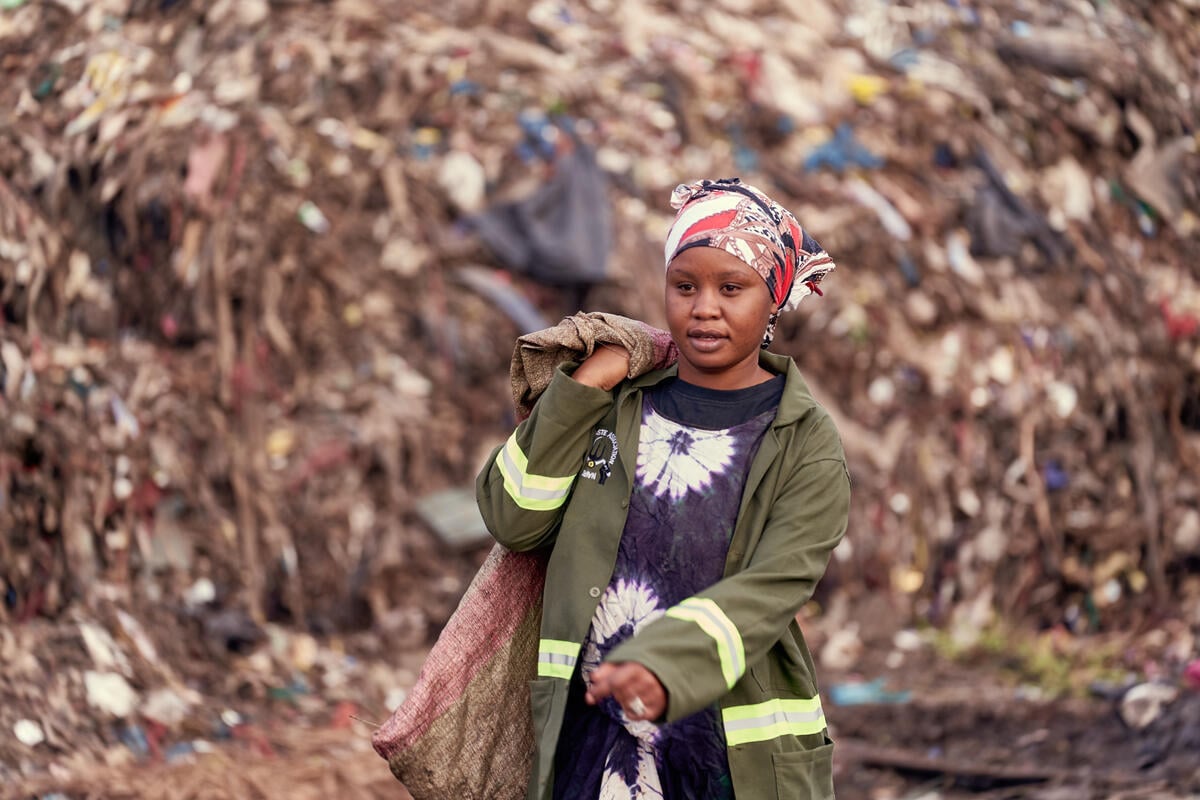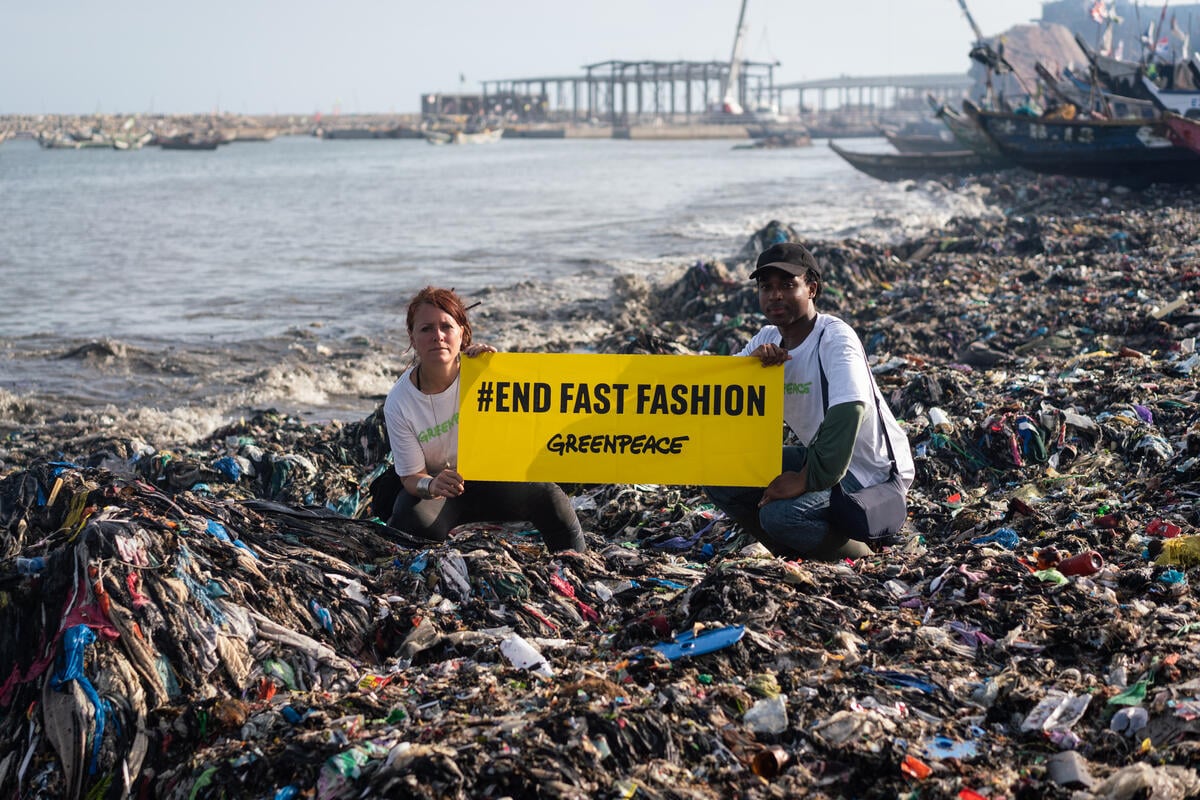Hamburg, Germany – The global fashion industry will not address its destructive impact on the climate without regulation, according to a new report by Greenpeace Germany — Self regulation: a fashion fairytale.[1] An assessment of 29 leading brands, including Nike, adidas, H&M, G-Star and Primark, finds that voluntary commitments are nowhere near enough to slow down the growing volumes of textiles and change the destructive trajectory of fast fashion, with most impacts being felt in countries of the Global South, where clothes are made, and also dumped.[2]
“Instead of offering hope to their young customers by taking bold, transparent action to change the fast fashion system, more often than not, fashion brands are marketing “sustainability” initiatives which do not go far enough, or even worse, resorting to greenwashing with claims of recycled and recyclable clothing,” said Viola Woghlemuth, consumption campaigner at Greenpeace Germany. “This window dressing creates the illusion that something is being done, and encourages guilt-free overconsumption.”
Ten years after Greenpeace launched its Detox My Fashion campaign, securing pledges from 29 leading brands, to eliminate hazardous chemicals and with some also committing to tackle over-production by “slowing the flow and closing the loop”, Greenpeace Germany did an unannounced check to see if brands are still serious about their commitments.
The progress on eliminating hazardous chemicals is mostly positive and is game changing, showing that concerted action and transparency in supply chains is the key to industry transformation, but this success is limited to these brands which are taking action. In contrast, the report finds that examples of slowing the flow of new clothes are thin on the ground, and despite positive signs from some, such as Benneton and Esprit, most efforts are directed at recycling, which remains more of a myth than reality.
To solve this problem, Greenpeace calls on regulators to build on the model of corporate supply chain responsibility demonstrated by the Detox committed brands and apply it to the entire fashion sector. According to the report, this would not only replicate the Detox hazardous chemical achievements in the remaining 85% of the fashion industry but could also be the basis for tackling other major problems in the sector — including greenhouse gas emissions in the fast fashion supply chain, which are the biggest source of fashion’s considerable impact on the climate, and the 3rd highest, behind food and construction supply chains.[3]
“Corporate supply chain responsibility should not be a “nice to have”, but the cornerstone of EU regulations that aim to bring the impacts of the fashion industry to within environmental boundaries – and prevent catastrophic effects,” added Wohlgemuth.[4] “Without binding regulation, global fashion brands will continue tinkering at the edges of the destructive fast fashion business model while the volumes of clothes being made and consumed continue to increase. We need to change the system. Fast fashion will never be green.”
Ends.
Notes
[1] Self regulation: a fashion fairytale, Greenpeace has proved that Detoxing fashion supply chains is a game changer; but without regulation, fashion as usual will continue its destructive impacts on the climate – full report by Greenpeace Germany available here.
[2] Full list of brands assessed, all committed to Detox.
Fashion, sportswear and luxury: adidas, Benetton, Burberry, C&A, Coop, Esprit, Fast Retailing (Uniqlo), G-Star, H&M, (Inditex (Zara), Levi’s, Li Ning, Mango, Miroglio, M&S, Nike, Primark, Puma, Valentino, Victoria’s Secret. Multiple Retailers: Aldi Sud/Aldi Nord, COOP, Kaufland, Lidl, Rewe/Penny, Tchibo, Tesco (F&F). Outdoor: Paramo, Rotauf, Vaude.
[3] Global GHG emissions from the “big eight” supply chains: World Economic Forum/Boston Consulting Group (2021), Net-zero challenge: the supply chain opportunity.
[4] There are two legislative proposals currently being discussed in the EU to make the fashion industry more sustainable and hold companies to account for harm to human rights and the environment:
- The EU strategy for sustainable textiles aims to help the EU shift to a climate-neutral, circular economy and to ensure that the textile industry recovers from the COVID-19 crisis in a sustainable way. Its adoption is planned towards the end of 2021.
- The EU parliament has recently endorsed a proposed legislation on corporate due diligence. This binding EU law would ensure that companies are held accountable and liable when they harm – or contribute to harming – human rights and the environment or undermine good governance.
Contacts
Viola Wohlgemuth, consumption campaigner, Greenpeace Germany: [email protected], +49 151 2218 0971
Greenpeace International Press Desk: [email protected], +31 (0) 20 718 2470 (available 24 hours)
Follow @greenpeacepress on Twitter for our latest international press releases.



